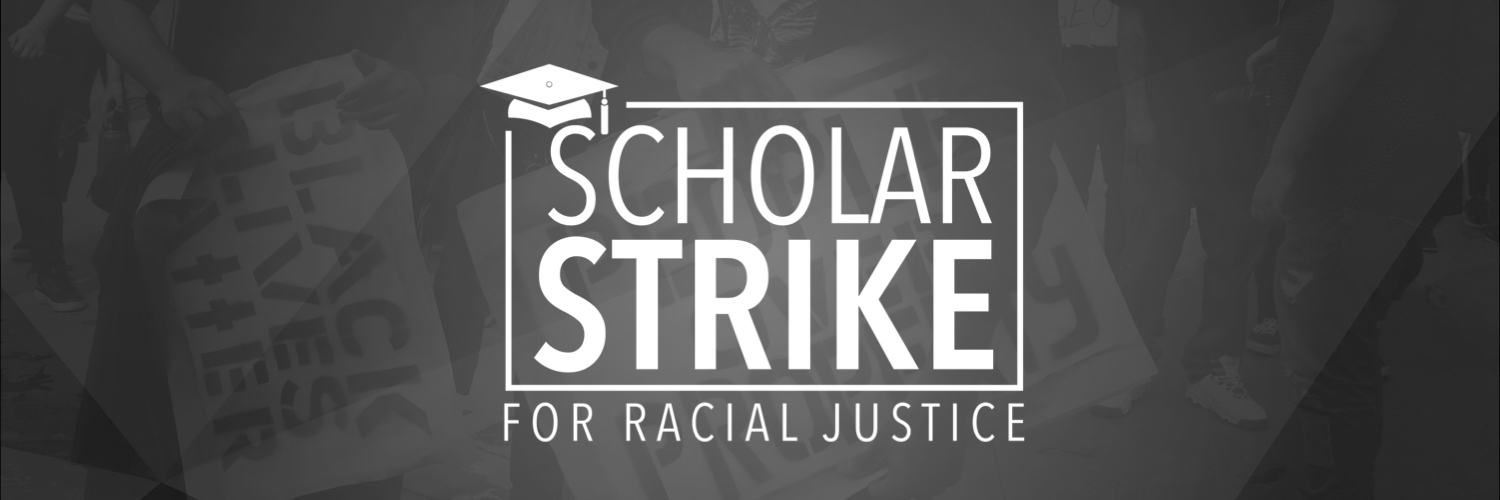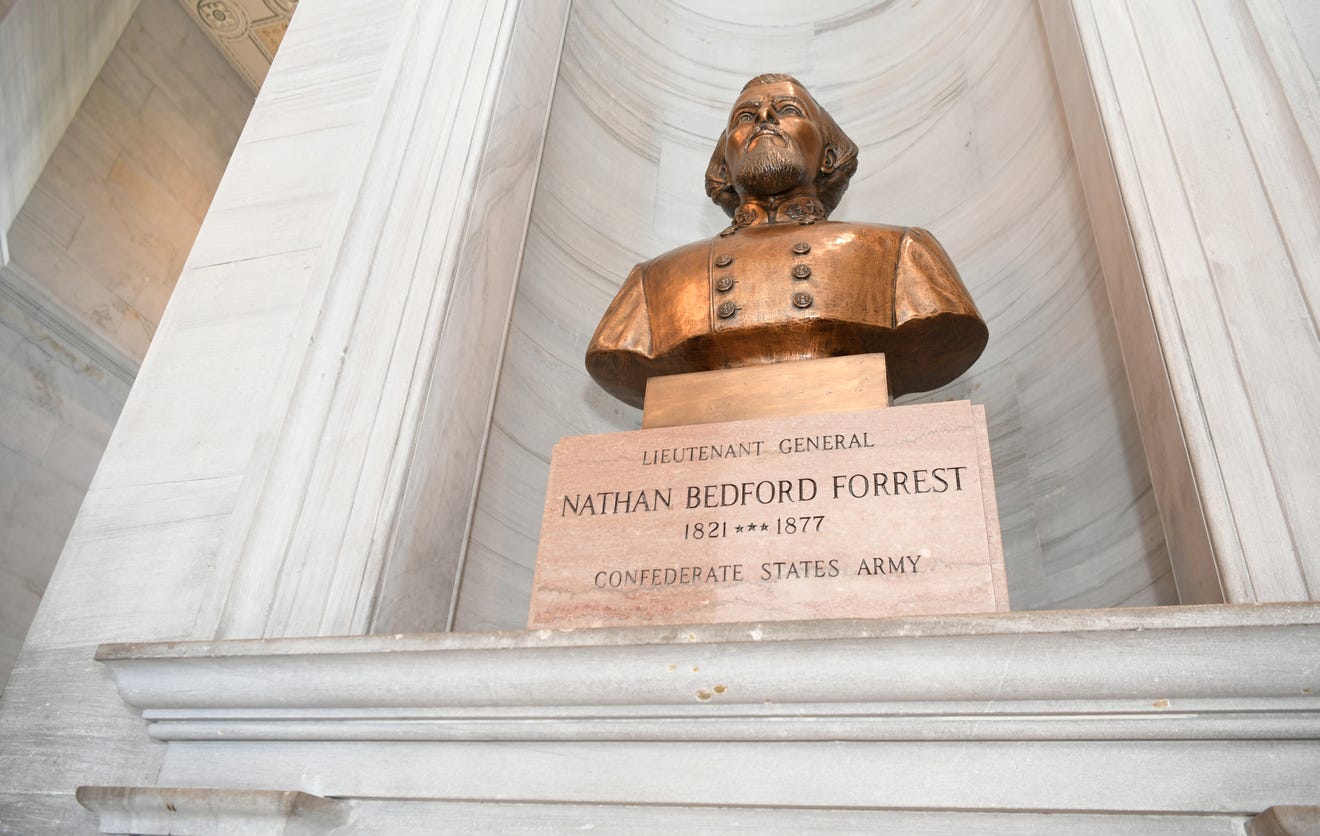Feature
-

#ScholarStrike
Vanderbilt Divinity Community, The Divinity School has always been a school of prophets and scholars, and also, disruptors. We are always looking for a way to challenge the injustices in the world, which is why it is no surprise that Vanderbilt Divinity School alumna Anthea Butler has created the… Read MoreSep. 5, 2020
-

A Call and Response to the Capitol Commission’s Historic Vote
Bust of Nathan Bedford Forrest on display in the Tennessee State Capitol. Shelley Mays/The Tennessean Dear all– We join a number of people today rejoicing to hear that the Capitol Commissioners voted to remove the bust of Gen. Nathan Bedford Forrest, U.S. Admiral David Farragut, and U.S. Admiral Albert Gleaves… Read MoreJul. 9, 2020
-

We have heard this before
Words from emilie m. townes, dean of Vanderbilt Divinity School, E. Rhodes and Leona B. Carpenter Chair, Professor of Womanist Ethics and Society Once again, a Black man was killed while in police custody. The images of his life slipping away because of the knee planted on his neck… Read MoreMay. 31, 2020
-

On Foyle’s War, Creativity, and COVID-19
Photo by russn_fckr on Unsplash A guest post from alumna Katy Attanasi, who earned her PhD in Christian Ethics from Vanderbilt University. In the Masterpiece Mystery series Foyle’s War, Detective Chief Superintendent Foyle solves regular crimes in an average British town during the extraordinary times of World… Read MoreMay. 1, 2020
-

Embodied Mutuality
A lenten reflection by Lyndsey Godwin (she, her, hers), Assistant Director of the Carpenter Program in Religion, Gender, and Sexuality. Foot-washing is a practice of mutuality, embodied. It represents, for me at least, the whole of Jesus’ ministry. This ritual, this… Read MoreApr. 9, 2020
-

Outside Our Service Area
Waste Not Want Not: A Beginner’s Composting Series This series focuses on our commitment to sustainability and ecotheology by offering tips and tools to live out what we say we believe. Amy E. Steele (she/her/hers), Assistant Dean for Student Affairs and Community Life at Vanderbilt Divinity School (VDS)… Read MoreApr. 2, 2020
-

Why Nashville?
Guest post from The Rev. Laura M. Cheifetz (she/her), Assistant Dean of Admissions, Vocation, and Stewardship This post is part of a series titled, “Why Vanderbilt Divinity” that provides different perspectives from the Vanderbilt Divinity School (VDS) community about why VDS makes a top school to consider for… Read MoreApr. 2, 2020
-

The Elevator Speech
Guest post from The Rev. Laura M. Cheifetz (she/her), Assistant Dean of Admissions, Vocation, and Stewardship This post is part II of a series titled, “Why Vanderbilt Divinity” that provides different perspectives from the Vanderbilt Divinity School (VDS) community about why VDS makes a top school to consider for graduate… Read MoreApr. 1, 2020
-

Why Vanderbilt Divinity School
Guest post from The Rev. Laura M. Cheifetz (she/her), Assistant Dean of Admissions, Vocation, and Stewardship This post is part of a series titled, “Why Vanderbilt Divinity” that provides different perspectives from the Vanderbilt Divinity School (VDS) community about why VDS makes a top school to consider for graduate theological education. Vanderbilt Divinity School New Interior PhotographyPhoto by: Susan Urmy Why did I decide to work as Assistant Dean of Admissions, Vocation, and Stewardship at Vanderbilt University Divinity School? Why, oh why, would I get back into theological education? (I have had this conversation with plenty of folks, so I might as well put it up for all.) (This is really long.) I would not work just anywhere in theological education, which is probably how pretty much everyone in theological education feels. Apparently I like to work in industries facing serious challenges, and theological education is no exception. Seeking a share of students from an ever-dwindling pool, with my office’s work being the one the school really hinges on (as in, no students? Not enough students? We’re going down.), isn’t a picnic. I am not a Vanderbilt alumna. The only time I spent more than a day at the campus prior to this was in 2001, my very first trip to Nashville, when I came to Vanderbilt Divinity School for the FTE Ministry Fellows conference. It was also the first time I heard Walter Brueggemann preach/speak. It was mind-blowing. Why Vanderbilt? I love my church, but I really love being in an ecumenical space. It’s more interesting, frankly. Vanderbilt isn’t tied to one denomination. (I used to think it was Methodist, but it’s not — since like the early 1900s. It’s on the list of approved schools for UMC folks, though.) I have always liked working in spaces that gave me freedom. This is one of those spaces. They are doing legitimately interesting things. Among them are the following: One of the professors co-founded three “Friendship Houses” in Nashville where graduate students live in community with people with intellectual and/or developmental disabilities. The purposes and commitments of the school have undergone revision by a group of students, faculty, and staff. Yes, students. The new curriculum requires MDiv students and allows MTS students to choose specific concentrations. There are 10. They are so cool. Prison and Carceral Studies? Yes. Chaplaincy? Yes. Religion and the Arts? Yes. Spirituality and Social Action? Yes. And so on. The Field Studies program is well-developed, and not stuck in place. The people running it are experienced (like over 20 years experienced). They also keep learning and expanding. Students can do field education in undergraduate institutions, chaplaincy in hospital or prison or higher education setting, congregations, non-profit and advocacy organizations, etc. 8 certificates that students may earn along with the MDiv or MTS, four of which are offered by the university. Access to programming by 6 different programs on gender, Black church studies, economic justice, the arts, etc. The Divinity School is embedded in a university. That provides an enormous advantage because of the infrastructure already in place. Do I want more freedom? Sure. But with policies come lots and lots of resources. Internal marketing and printing services? Yes. Access to a state-of-the-art recreational facility? Yes. Cross-registering in courses in other graduate and professional schools within the university (paying the same rate as the Div School courses)? Yes. Ample health services (even one clinic just for staff/faculty)? Yes. Spiritual support through worship opportunities, and denominational liaisons. Everyone, including those who are unaffiliated with a denomination, gets a liaison. These groups gather monthly, provide spaces for vocational discernment and ongoing formation. Or just community. No one can commiserate better about your tradition’s ordination process that someone going through the same thing. Good availability of financial aid. (I just did some math and figured out the median award is 75% of tuition.) And, cf the next point, the student loan burden is on a downward trend, thanks in least in part through deliberate efforts made by the school. A whole staff person (thanks to the Lilly Endowment, Inc. in its funding of the Economic Challenges Facing Future Ministers initiative coordinated by the Association of Theological Schools) who provides support to students on creating a financial plan to make Divinity School accessible and not a future burden, and support throughout the degree program in vocational discernment and career placement. Colleagues — faculty, staff — who are impressive and also nice. And so many of us are gay/queer/lesbian/trans. I’m serious. It’s so great. Four of six deans. Three of us are women of color. Five of us are women. And, finally, the Reverend Doctor emilie townes. Or as one of my friends kept texting me when I first got the job, EMILIE TOWNES. The opportunity to work with a preeminent scholar who is known for being a good administrator, a good boss, and a good mentor? Yes. (She checked my references, so I checked hers.) I am not a school/national/denominational spirit type of person. I used to skip high school assemblies, attended one football game and decided that I was better suited to spending Friday nights at the Seattle Opera instead, haven’t said the pledge of allegiance since I was in 10th grade, don’t sing along to the national anthem, and can tell you about an hour’s worth of stuff that’s wrong with my church. But making it possible for people from diverse life circumstances to get an academically rigorous education from diverse faculty in an institution with a bias toward justice with integrity that will help them deepen their ministries, serve others, advocate for marginalized persons, explore their own faith traditions, committed to being that progressive education in the Bible belt even though it would be easier to be somewhere else in a blue bubble? Yes, please. P.S. And of course, if you know someone who is interested in theological education, I’m happy to talk with them. P.P.S. And why Nashville? It’s only four hours from Atlanta. We have lots of friends in Nashville. It’s more diverse, larger, with a better airport that has more nonstops to our typical destinations like LA and SEA, than Louisville. And we have family south of Nashville, which means the dogs and I have been able to hang out on weekends with my sister-in-law and nieces because our spouses are both gone a lot. Read MoreApr. 1, 2020
-

a moment of meditation
As we explore what it means to be in community virtually, we’ve been meeting weekly on Mondays for a moment of poetry, song, and silence. Periodically, we’ll be sharing parts of those gatherings here, as a resource for you to center… Read MoreApr. 1, 2020